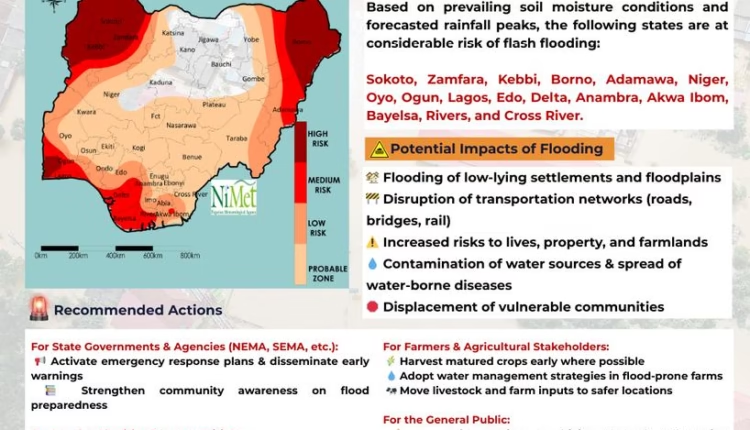The Nigerian Meteorological Agency (NiMet) has issued a fresh flash flood alert, warning that 16 states across the country face considerable risk in the coming days due to prevailing soil moisture and forecasted rainfall peaks.
Our correspondent gathered from NiMet’s latest advisory that the high-risk states include Sokoto, Zamfara, Kebbi, Borno, Adamawa, Niger, Oyo, Ogun, Lagos, Edo, Delta, Anambra, Akwa Ibom, Bayelsa, Rivers, and Cross River.
According to the agency, the potential impacts of the flooding may be far-reaching, including inundation of low-lying settlements, disruption of major transportation networks, contamination of water sources, destruction of farmlands, displacement of vulnerable communities, and increased risks to lives and property.
“Floods at this scale threaten not only homes and businesses but also critical infrastructure and agriculture,” the advisory warned, “Communities must act now to reduce the impact.”
NiMet outlined specific recommendations for various sectors.
State governments and emergency agencies such as NEMA and SEMA are urged to activate emergency response plans, disseminate early warnings, strengthen public awareness on flood preparedness, and preposition relief materials in high-risk zones.
Local authorities and community leaders have been advised to clear drainage systems, enforce safe waste disposal, and discourage settlement along floodplains and blocked waterways. Temporary relocation from highly flood-prone areas has also been recommended where necessary.
For the agricultural sector, farmers have been encouraged to harvest matured crops early, adopt water management strategies, and move livestock and farm inputs to safer locations.
The general public is warned against walking or driving through fast-moving floodwaters and urged to report early signs of flooding to local authorities.
NiMet emphasised that continuous monitoring and timely updates will be provided, urging all citizens to remain alert.
“An informed community is a prepared community. Knowing the risks and acting early can save lives,” the agency stated.

